五年级人教版英语书
- 格式:doc
- 大小:83.00 KB
- 文档页数:5
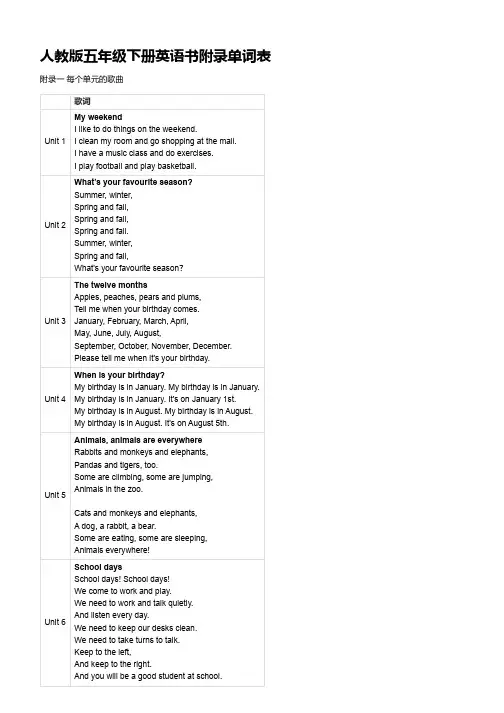
人教版五年级下册英语书附录单词表附录一每个单元的歌曲歌词Unit 1My weekendI like to do things on the weekend.I clean my room and go shopping at the mall.I have a music class and do exercises.I play football and play basketball.Unit 2What’s your favourite season? Summer, winter,Spring and fall,Spring and fall,Spring and fall.Summer, winter,Spring and fall,What's your favourite season?Unit 3The twelve monthsApples, peaches, pears and plums,Tell me when your birthday comes. January, February, March, April,May, June, July, August,September, October, November, December. Please tell me when it's your birthday.Unit 4When is your birthday?My birthday is in January. My birthday is in January. My birthday is in January. It's on January 1st.My birthday is in August. My birthday is in August. My birthday is in August. It's on August 5th.Unit 5Animals, animals are everywhere Rabbits and monkeys and elephants, Pandas and tigers, too.Some are climbing, some are jumping, Animals in the zoo.Cats and monkeys and elephants,A dog, a rabbit, a bear.Some are eating, some are sleeping, Animals everywhere!Unit 6School daysSchool days! School days!We come to work and play.We need to work and talk quietly.And listen every day.We need to keep our desks clean.We need to take turns to talk.Keep to the left,And keep to the right.And you will be a good student at school.附录二单元词汇表(注:黑体词要求学生能够听、说、读、写;白体词只作听、说、认读要求。
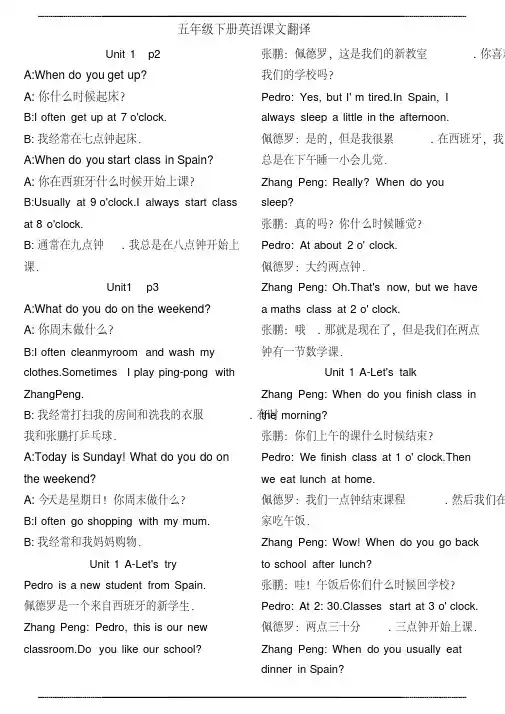
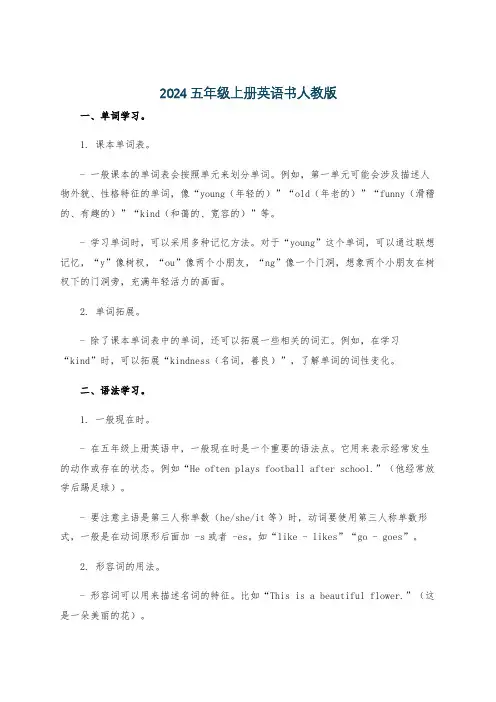
2024五年级上册英语书人教版一、单词学习。
1. 课本单词表。
- 一般课本的单词表会按照单元来划分单词。
例如,第一单元可能会涉及描述人物外貌、性格特征的单词,像“young(年轻的)”“old(年老的)”“funny(滑稽的、有趣的)”“kind(和蔼的、宽容的)”等。
- 学习单词时,可以采用多种记忆方法。
对于“young”这个单词,可以通过联想记忆,“y”像树杈,“ou”像两个小朋友,“ng”像一个门洞,想象两个小朋友在树杈下的门洞旁,充满年轻活力的画面。
2. 单词拓展。
- 除了课本单词表中的单词,还可以拓展一些相关的词汇。
例如,在学习“kind”时,可以拓展“kindness(名词,善良)”,了解单词的词性变化。
二、语法学习。
1. 一般现在时。
- 在五年级上册英语中,一般现在时是一个重要的语法点。
它用来表示经常发生的动作或存在的状态。
例如“He often plays football after school.”(他经常放学后踢足球)。
- 要注意主语是第三人称单数(he/she/it等)时,动词要使用第三人称单数形式,一般是在动词原形后面加 -s或者 -es。
如“like - likes”“go - goes”。
2. 形容词的用法。
- 形容词可以用来描述名词的特征。
比如“This is a beautiful flower.”(这是一朵美丽的花)。
- 形容词的位置通常在名词之前,但是在“be动词+形容词”结构中,形容词作表语,位于be动词之后,如“She is cute.”(她很可爱)。
三、课文学习。
1. 课文理解。
- 每篇课文都有其主题和核心内容。
例如,有的课文是关于家庭的,会介绍家庭成员的职业、爱好等。
在学习课文时,要先通读全文,了解大致内容,然后再逐句分析。
- 可以通过回答一些问题来加深对课文的理解,比如对于一篇关于学校生活的课文,可以问自己“Where does the story happen?”(故事发生在哪里?)“Who are the main characters?”(主要人物是谁?)2. 课文背诵。
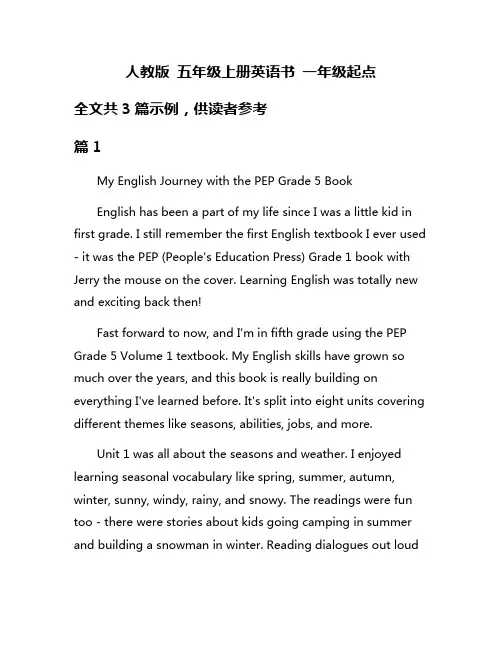
人教版五年级上册英语书一年级起点全文共3篇示例,供读者参考篇1My English Journey with the PEP Grade 5 BookEnglish has been a part of my life since I was a little kid in first grade. I still remember the first English textbook I ever used - it was the PEP (People's Education Press) Grade 1 book with Jerry the mouse on the cover. Learning English was totally new and exciting back then!Fast forward to now, and I'm in fifth grade using the PEP Grade 5 Volume 1 textbook. My English skills have grown so much over the years, and this book is really building on everything I've learned before. It's split into eight units covering different themes like seasons, abilities, jobs, and more.Unit 1 was all about the seasons and weather. I enjoyed learning seasonal vocabulary like spring, summer, autumn, winter, sunny, windy, rainy, and snowy. The readings were fun too - there were stories about kids going camping in summer and building a snowman in winter. Reading dialogues out loudwith my classmates helped me practice pronunciation and intonation.In Unit 2, we learned how to talk about abilities using can and can't. For example, "I can run fast" or "My brother can't swim." It was great practicing this in a fun way by playing games like charades in class where we had to act out abilities. The unit also had me thinking critically by analyzing what skills are needed for different jobs and activities.Units 3 and 4 focused on jobs and daily routines. There were lots of new job vocabulary words like doctor, nurse, police officer, and teacher. I loved reading engaging stories about characters with different professions. One story was about a doctor helping sick animals - it made me want to be a veterinarian! The routines section taught me how to talk about my daily schedule using phrases like "I get up at 7 AM" and "I have English class on Mondays."Midway through the book, Unit 5 was all about toys and hobbies. I learned names of toys like dolls, cars, puzzles, and video games. A funny story was about a boy whose toy robot came to life and caused mischief around the house! For hobbies, there were dialogues discussing interests like reading, cooking, traveling, and collecting things. My hobbies are swimming andplaying soccer, so I enjoyed practicing how to express that in English.Unit 6 taught me to describe people's appearances and personalities. Adjectives like tall, short, thin, kind, funny, and serious were very useful. We did fun activities likedrawingpictures of our friends and family members, then describing their looks and personalities. I'll never forget the reading about a girl who couldn't recognize her mischievous brother because he got a crazy haircut!In Unit 7, we learned loads of vocabulary related to animals - everything from pets like dogs and cats to farm animals like cows and chickens to wild animals like lions and monkeys. My favorite story was about a boy who wanted to bring a baby elephant home as a pet! Imagining how that would go was hilarious. This unit also taught me how to use pronouns like it, they, and them to talk about animals.The final Unit 8 was about places like homes, schools, parks, and cities. I enjoyed the readings comparing modern homes to traditional homes in the past. One story was set in aneco-friendly green city of the future - it sounded like an amazing place to live! To wrap up the unit, we did a fun project making 3Dmodels of our dream homes and presenting them to the class in English.Overall, the PEP Grade 5 Volume 1 book has been an awesome way for me to keep improving my English this year. The themes are engaging and relatable for kids my age. The stories are fun and often funny too which makes them more enjoyable to read. Practicing conversation dialogues out loud has really helped me speak more naturally. And I've learned so many great new vocabulary words for describing the world around me.My English journey starting from that little Grade 1 book has been such a rewarding experience so far. I can't wait to continue building my skills with the PEP materials for Grade 5 Volume 2 and beyond. Knowing English will open up so many future opportunities for me both in China and internationally. I'm grateful my school has provided such a strong English program from the very beginning. Studying this language isn't always easy, but it's definitely been worth it. I'm excited to see where my English skills will take me next!篇2My English Textbook AdventureWow, can you believe we're already in 5th grade? It feels like just yesterday we were those tiny little 1st graders struggling to learn the English alphabet. Now here we are, reading stories and having conversations in a whole new language! I have to admit, when I first cracked open this huge new PEP English textbook for 5th grade, I was a little intimidated. But as we've worked through it week after week, I've come to really enjoy it. Let me tell you all about our English learning journey this year!The book starts off by reviewing what we learned in 4th grade, like asking and answering questions using "What's this?", talking about different occupations, describing people's appearances, and so on. Even though it was mostly review, it was good to refresh those skills. After the review section, we've covered 6 main units so far this semester.Unit 1 was called "A Hot Weekend" and it was all about talking about the weather and temperature. We learned vocabulary words like sunny, windy, cloudy, and freezing. There were lots of funny pictures showing people dressing for different kinds of weather. My favorite was the picture of the kid wearing a huge puffy jacket, scarf, and ear muffs when it was freezing outside! We practiced asking "What's the weather like today?" and responding with descriptive sentences. I think weathervocabulary will be really useful, especially when we're older and traveling to different places.The next unit was "At the Bookstore" which taught us words related to books and reading. I thought it would be kind of boring, but it ended up being really fascinating! We read stories about the earliest forms of books, like stone slabs and papyrus scrolls from Ancient Egypt and China. We learned words like "cover", "title", "author", and "illustrator." Towards the end of the unit, we had to do a project where we "published" our very own little classroom books, complete with a cover, title page, and our own illustrations. I drew a story about my dog getting lost in the park. It was so cool to see our books displayed in the classroom library!After that was Unit 3 which focused on describing people's clothes and daily routines. We learned neat words like "get dressed", "have breakfast/lunch/dinner", "go to school/bed", and of course all the clothing vocabulary like shirts, pants, skirts, etc. One of the readings was about the legendary cartoons The Mr. Men Show and how the characters' outfits reflect their personalities, which I thought was a really fun way to learn clothing words. We also did a bunch of fun role-plays where we acted out a character's daily routine. My group did a skit aboutMr. Worry Wart who had to follow a very particular morning routine or else he would start freaking out!The unit that I struggled with the most though, was Unit 4 - "All About Sports." Don't get me wrong, I love playing sports! But learning the specific vocabulary in English was so hard for me. Words like "kick", "throw", "catch", and all the different sports like "basketball", "soccer", "tennis", and more. No matter how many times I practiced, I kept mixing them up! We had to do an end-of-unit project where we picked a sport and made a poster explaining the rules and equipment, all in English of course. I chose soccer since that's what I play, but I still got a few terms wrong on my poster. I'll just have to keep practicing!Unit 5 was one of my favorites - it was called "My Community" and we learned all about the different places you can find in a community like stores, the post office, parks, and hospitals. We read super interesting non-fiction texts to learn background about these places. For example, did you know that the first mailboxes in the world were set up in France by their king? And people used to rent mailboxes, kind of like how we get a PO box today. Wild, right? For the unit project, we worked in groups to actually build a model community out of popsiclesticks, construction paper, and other craft supplies. It was so fun bringing our model town to life!The most recent unit we covered is Unit 6 - "Going Places." This one was all about reading maps, giving directions, and talking about different methods of transportation. I loved reading the wild stories about some of the earliest explorers who went on daring adventures to map the world for the first time. We learned map symbols, cardinal directions, and phrases like "go straight", "turn left/right", and "keep going." For our final unit project, we had to plan out a trip somewhere using maps, transportation routes, and giving written explanations and directions in English. I chose to "travel" to Hawaii since I've always dreamed of going there! We even got to write about what activities we would want to do on our dream trip.Phew, that's everything篇3My English Textbook for 5th GradeThis year in 5th grade, we are using the PEP English textbook Volume 1 for students who started learning English way back in 1st grade. I have to say, this textbook is pretty cool! It's helpingme continue building my English skills after four years of learning the language.The book has 8 units total, each focused on a different topic. Unit 1 is called "My Hobby" and it's all about discussing our favorite hobbies and activities we enjoy. The readings talk about kids' hobbies like singing, dancing, reading, and playing sports or musical instruments. There are fun dialogues where characters talk about their hobbies too. I really liked this unit because it let me share about my own hobbies of swimming and reading fiction books. The unit had us practice patterns like "I'm good at..." and "My hobby is..."Unit 2 is titled "Animals" and explores all kinds of different creatures. We read stories about kids' experiences with pets like dogs, cats, rabbits, and hamsters. There was even a funny story about a kid who brought his pet frog to school! This unit had really cool photos and facts about all sorts of exotic animals too. We practiced using adjectives to describe animals, like "furry", "cute", "big" and "small". I made a poster presentation about my favorite animal, which is the panda.The third unit focuses on "My Day" and describes a typical daily routine. The readings show kids waking up, eating breakfast, going to school, doing homework, playing, eating dinner, andgetting ready for bed. I related to this one a lot! We worked on telling time, using phrases like "in themorning/afternoon/evening", and vocabulary around common daily activities. It was neat to compare my daily schedule to the one shown for the fictional characters.Unit 4 is called "The Four Seasons" and explores how different seasons of the year bring changes in weather, nature, and activities we enjoy. Spring, summer, fall, and winter are all covered through stories, poems, and informational texts. My favorite was the winter section which described building snowmen and going sledding. This unit had us practice season vocabulary as well as words for types of precipitation like "rain", "snow", and "hail". We did a fun project making arts and crafts to represent each season.The middle Unit 5 has the topic of "Flavours" and is all about different kinds of foods and drinks. I remember analyzing the taste categories of sweet, sour, bitter, and spicy/hot. There were funny dialogues of characters trying new exotic foods and making funny faces! We read about cuisines from around the world too. This unit helped me learn how to say if I liked or disliked a food, using "delicious", "yummy", "disgusting", etc. We also went over food vocabulary like "vegetables", "fruits", "meat",and "dairy". At the end, we did a fun role-play ordering food at a restaurant.Unit 6 moves to the theme of "Traffic", teaching about different transportation methods. We covered cars, buses, bicycles, airplanes, boats, and even hot air balloons! There were some crazy stories, like one about a family's disastrous road trip. My favorite was learning about high-speed rail in China. We practiced saying how we travel to different places, like "I go to school by bus" or "I went to Beijing by plane". There were useful dialogues too, like asking for directions or purchasing train tickets.The next unit is titled "Have you ever been to...?" and it's all about talking about visiting different places around the world. We read travel logs about kids going on exciting adventures and tours in places like Egypt, Australia, India, Mexico, and even outer space! They described famous landmarks and cool cultural experiences. This unit had us using the present perfect tense, as well as vocabulary around travel, tourism, and famoussites/attractions. It really motivated me to want to travel more after reading those interesting stories.Finally, Unit 8 covers the topic of "Telling Stories" and has a collection of short fictional stories for us to read and analyze. Welooked at story elements like characters, setting, plot, conflict, and resolution. The stories came from all over the world with creative plots and teachings morals or lessons. It was cool learning about different cultures through the lens of literature. This unit had us summarizing stories, discussing our favorite parts, and even writing our own short narratives.Overall, I'm really enjoying using this PEP English textbook so far! The units cover such a nice variety of practical,high-interest themes that make me excited to keep building my English skills. The readings are a good challenge for my level, but still pretty comprehensible. I like how there are lots of dialogues and speaking activities to practice conversation. The vocabulary and grammar we learn is very useful too. My teachers make the classes fun and interactive by having us do group work, role plays, presentations, and projects relating to each unit's topic. With cool illustrations, games, songs, and more, this textbook really makes learning English an engaging experience. I'm looking forward to continuing with Volume 2 next semester!。
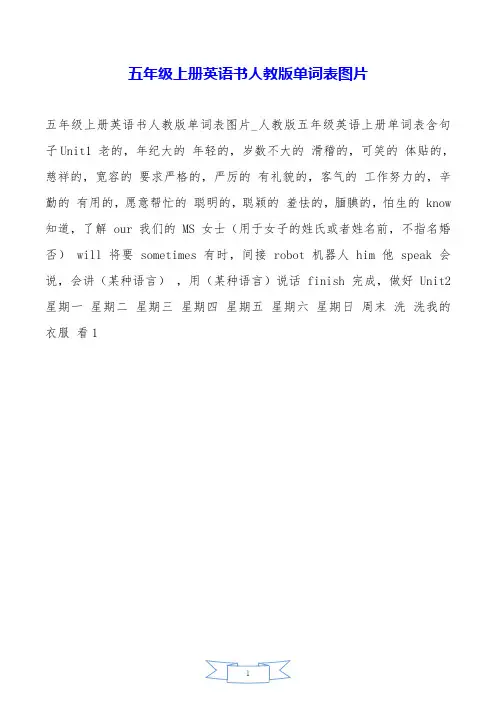
五年级上册英语书人教版单词表图片五年级上册英语书人教版单词表图片_人教版五年级英语上册单词表含句子Unit1 老的,年纪大的年轻的,岁数不大的滑稽的,可笑的体贴的,慈祥的,宽容的要求严格的,严厉的有礼貌的,客气的工作努力的,辛勤的有用的,愿意帮忙的聪明的,聪颖的羞怯的,腼腆的,怕生的 know 知道,了解 our 我们的 MS 女士(用于女子的姓氏或者姓名前,不指名婚否) will 将要 sometimes 有时,间接 robot 机器人 him 他 speak 会说,会讲(某种语言),用(某种语言)说话 finish 完成,做好 Unit2 星期一星期二星期三星期四星期五星期六星期日周末洗洗我的衣服看1看电视做,干做作业看,读看书踢,玩,参加踢足球 cooking 烹饪,烹调 often 时常,常常 park 公园 tired 疲倦的 sport 体育运动 play sports 做体育运动 should (常用于纠正别人)应该,应当 every 每一个,每个 day 一天,一日 schedule 工作计划,日常安排 Unit3 三明治蔬菜沙拉,水鬼沙拉汉堡包冰激凌茶,茶水新鲜的,刚摘得健康的美味的,可口的辣的,辛辣的含糖的,甜的 drink 喝,饮 thirsty 渴的,口渴的 favourite 特别喜爱的 food 食物2Dear 亲爱的(用于信函抬头的名字或头衔前) onion 洋葱,葱头 Unit4 唱,唱歌歌曲唱英文歌曲弹琵琶功夫,武术练武术跳舞画漫画画漫画烹调;烹饪游泳打篮球乒乓球打乒乓球说英语 we’ll=we will party 聚会;派对 next 下一个的;紧接着的;接下来的 wonderful 极好的,了不起的 learn 学;学习;学会 any 任何的,任一的 problem 问题no problem 没问题 want 要,想要 send 邮寄;发送 email 电子邮件 at (后面接邮件地址) unit53时钟;钟植物瓶子水瓶自行车,脚踏车照片,相片正面在· · · · · · 前面在· · · · · 中间在(或向)· · · · · · 上面在旁边(附近)在(或向)· · · · · · 后面 there 表示存在或发生 grandparent 祖父,祖母,外祖父,外祖母their 他们的,她们的,它们的 house 住房,房子,住宅 lot 大量,许多 lots of 大量,许多 flower 花,花朵 move 搬家 dirty 肮脏的everywhere 处处,到处 mouse 老鼠 live 住,居住 nature 自然界的,大自然的 Unit6 森林,林区河,江湖;湖泊高山;山岳山丘;小山树;树木;乔木4桥建筑物;房子;楼房村庄,村镇房屋;房子,住宅 boating 划船 go boating 去划船 aren’t =are not rabbit 兔,野兔 high 高的 Unit1 他年轻吗?不,他不年轻。
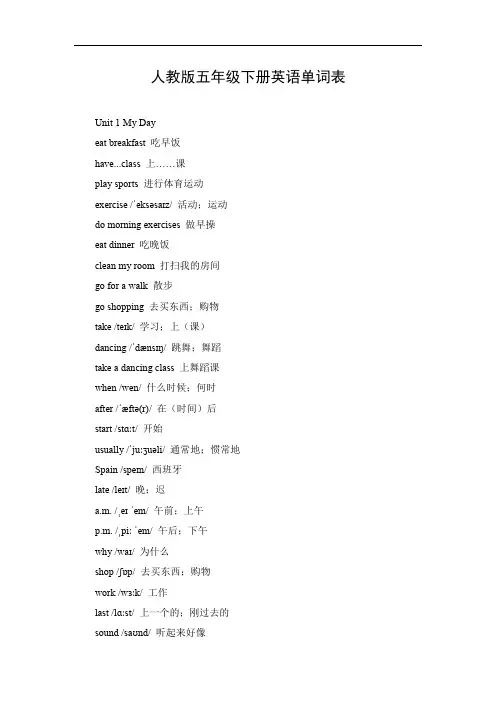
人教版五年级下册英语单词表Unit 1 My Dayeat breakfast 吃早饭have...class 上……课play sports 进行体育运动exercise /ˈeksəsaɪz/ 活动;运动do morning exercises 做早操eat dinner 吃晚饭clean my room 打扫我的房间go for a walk 散步go shopping 去买东西;购物take /teɪk/ 学习;上(课)dancing /ˈdænsɪŋ/ 跳舞;舞蹈take a dancing class 上舞蹈课when /wen/ 什么时候;何时after /ˈæftə(r)/ 在(时间)后start /stɑːt/ 开始usually /ˈjuːʒuəli/ 通常地;惯常地Spain /speɪn/ 西班牙late /leɪt/ 晚;迟a.m. /ˌeɪ ˈem/ 午前;上午p.m. /ˌpiː ˈem/ 午后;下午why /waɪ/ 为什么shop /ʃɒp/ 去买东西;购物work /wɜːk/ 工作last /lɑːst/ 上一个的;刚过去的sound /saʊnd/ 听起来好像also /ˈɔːlsəʊ/ 还;也busy /ˈbɪzi/ 忙的need /niːd/ 需要play /pleɪ/ 戏剧;剧本letter /ˈletə(r)/ 信live /lɪv/ 居住island /ˈaɪlənd/ 岛always /ˈɔːlweɪz/ 总是;一直cave /keɪv/ 山洞;洞穴go swimming 去游泳Unit 2 My Favorite Season spring /sprɪŋ/ 春天summer /ˈsʌmə(r)/ 夏天autumn /ˈɔːtəm/ 秋天winter /ˈwɪntə(r)/ 冬天season /ˈsiːzn/ 季节picnic /ˈpɪknɪk/ 野餐go on a picnic 去野餐pick /pɪk/ 摘;采集pick apples 摘苹果snowman /ˈsnəʊmæn/ 雪人make a snowman 堆雪人go swimming 去游泳which /wɪtʃ/ 哪一个best /best/ 最;最高程度地snow /snəʊ/ 雪good job 做得好because /bɪˈkɒz/ 因为vacation /vəˈkeɪʃn/ 假期all /ɔːl/ 全;完全pink /pɪŋk/ 粉色;粉色的lovely /ˈlʌvli/ 可爱的;美丽的leaf /liːf/ 叶子(复数leaves)fall /fɔːl/ 落下;秋天paint /peɪnt/ 用颜料绘画Unit 3 My School Calendar January /ˈdʒænjuəri/ 一月February /ˈfebruəri/ 二月March /mɑːtʃ/ 三月April /ˈeɪprəl/ 四月May /meɪ/ 五月June /dʒuːn/ 六月July /dʒuˈlaɪ/ 七月August /ˈɔːɡəst/ 八月September /sepˈtembə(r)/ 九月October /ɒkˈtəʊbə(r)/ 十月November /nəʊˈvembə(r)/ 十一月December /dɪˈsembə(r)/ 十二月plant /plɑːnt/ 种植contest /ˈkɒntest/ 比赛;竞赛year /jɪə(r)/ 年few /fjuː/ 一些;很少a few 一些thing /θɪŋ/ 事情meet /miːt/ 集会;开会sports meet 运动会Easter /ˈiːstə(r)/ 复活节trip /trɪp/ 旅行national /ˈnæʃnəl/ 国家的National Day 国庆节American /əˈmerɪkən/ 美国的Thanksgiving /ˌθæŋksˈɡɪvɪŋ/ 感恩节Christmas /ˈkrɪsməs/ 圣诞节great /ɡreɪt/ 极好的;伟大的Unit 4 When Is Easter?first /fɜːst/ 第一(的)second /ˈsekənd/ 第二(的)third /θɜːd/ 第三(的)fourth /fɔːθ/ 第四(的)fifth /fɪfθ/ 第五(的)twelfth /twelfθ/ 第十二(的)twentieth /ˈtwentiəθ/ 第二十(的)twenty-first /ˈtwentiˈfɜːst/ 第二十一(的)twenty-third /ˈtwentiˈθɜːd/ 第二十三(的)thirtieth /ˈθɜːtiəθ/ 第三十(的)special /ˈspeʃl/ 特殊的;特别的fool /fuːl/ 蠢人;傻瓜kitten /ˈkɪtn/ 小猫diary /ˈdaɪəri/ 日记still /stɪl/ 仍然;依旧;还是noise /nɔɪz/ 声音;响声;噪音fur /fɜː(r)/ (某些动物的)浓密的软毛open /ˈəʊpən/ 开着的walk /wɔːk/ 行走Unit 5 Whose Dog Is It?mine /maɪn/ 我的yours /jɔːz/ 你(们)的his /hɪz/ 他的hers /hɜːz/ 她的theirs /ðeəz/ 他们的;她们的;它们的ours /ˈaʊəz/ 我们的climbing /ˈklaɪmɪŋ/ (climb 的-ing 形式)攀登;攀爬eating /ˈiːtɪŋ/ (eat 的-ing 形式)吃playing /ˈpleɪɪŋ/ (play 的-ing 形式)玩耍jumping /ˈdʒʌmpɪŋ/ (jump 的-ing 形式)跳drinking /ˈdrɪŋkɪŋ/ (drink 的-ing 形式)喝sleeping /ˈsliːpɪŋ/ (sleep 的-ing 形式)睡觉each /iːtʃ/ 每一;各个other /ˈʌðə(r)/ 其他each other 相互excited /ɪkˈsaɪtɪd/ 兴奋的;激动的like /laɪk/ 像……那样Unit 6 Work Quietly!doing morning exercises(正在)做早操having...class(正在)上……课eating lunch(正在)吃午饭reading a book(正在)看书listening to music(正在)听音乐keep /kiːp/ 保持某种状态keep to the right 靠右keep your desk clean 保持你的课桌干净talk quietly 小声讲话turn /tɜːn/ 顺序take turns 按顺序来bamboo /ˌbæmˈbuː/ 竹子its /ɪts/ 它的;他的;她的show /ʃəʊ/ 给人看;指引anything /ˈeniθɪŋ/ 任何事物else /els/ 另外;其他exhibition /ˌeksɪˈbɪʃn/ 展览say /seɪ/ 说;讲have a look 看一看sushi /ˈsuːʃi/ 寿司teach /tiːtʃ/ 教Canadian /kəˈneɪdiən/ 加拿大的Spanish /ˈspænɪʃ/ 西班牙的。
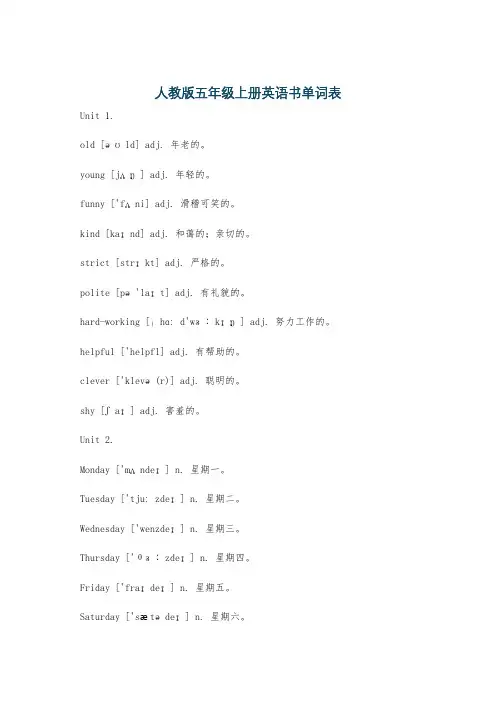
人教版五年级上册英语书单词表Unit 1.old [əʊld] adj. 年老的。
young [jʌŋ] adj. 年轻的。
funny ['fʌni] adj. 滑稽可笑的。
kind [kaɪnd] adj. 和蔼的;亲切的。
strict [strɪkt] adj. 严格的。
polite [pə'laɪt] adj. 有礼貌的。
hard-working [ˌhɑːd'wɜːkɪŋ] adj. 努力工作的。
helpful ['helpfl] adj. 有帮助的。
clever ['klevə(r)] adj. 聪明的。
shy [ʃaɪ] adj. 害羞的。
Unit 2.Monday ['mʌndeɪ] n. 星期一。
Tuesday ['tjuːzdeɪ] n. 星期二。
Wednesday ['wenzdeɪ] n. 星期三。
Thursday ['θɜːzdeɪ] n. 星期四。
Friday ['fraɪdeɪ] n. 星期五。
Saturday ['sætədeɪ] n. 星期六。
Sunday ['sʌndeɪ] n. 星期日。
weekend [ˌwiːk'end] n. 周末。
wash [wɒʃ] v. 洗。
wash my clothes 洗我的衣服。
watch [wɒtʃ] v. 看。
watch TV 看电视。
do [duː] v. 做;干。
do homework 做作业。
read [riːd] v. 读;阅读。
read books 看书。
Unit 3.sandwich ['sænwɪtʃ] n. 三明治。
salad ['sæləd] n. 沙拉。
hamburger ['hæmbɜːɡə(r)] n. 汉堡包。
ice cream [ˌaɪs 'kriːm] n. 冰淇淋。
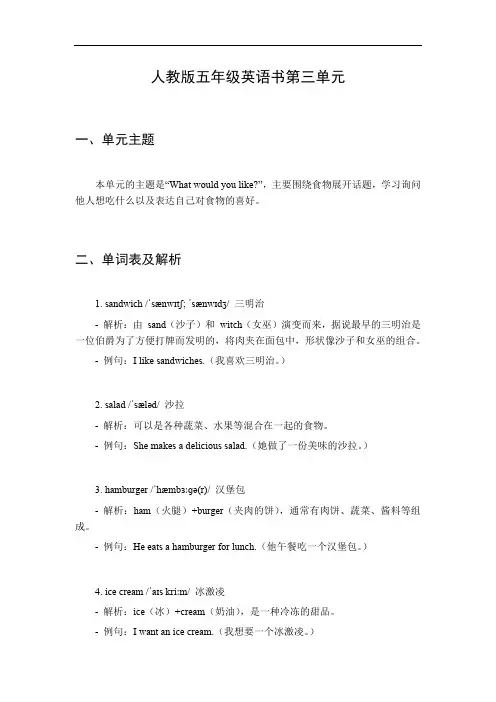
人教版五年级英语书第三单元一、单元主题本单元的主题是“What would you like?”,主要围绕食物展开话题,学习询问他人想吃什么以及表达自己对食物的喜好。
二、单词表及解析1. sandwich /ˈsænwɪtʃ; ˈsænwɪdʒ/ 三明治-解析:由sand(沙子)和witch(女巫)演变而来,据说最早的三明治是一位伯爵为了方便打牌而发明的,将肉夹在面包中,形状像沙子和女巫的组合。
-例句:I like sandwiches.(我喜欢三明治。
)2. salad /ˈsæləd/ 沙拉-解析:可以是各种蔬菜、水果等混合在一起的食物。
-例句:She makes a delicious salad.(她做了一份美味的沙拉。
)3. hamburger /ˈhæmbɜːɡə(r)/ 汉堡包-解析:ham(火腿)+burger(夹肉的饼),通常有肉饼、蔬菜、酱料等组成。
-例句:He eats a hamburger for lunch.(他午餐吃一个汉堡包。
)4. ice cream /ˈaɪs kriːm/ 冰激凌-解析:ice(冰)+cream(奶油),是一种冷冻的甜品。
-例句:I want an ice cream.(我想要一个冰激凌。
)5. tea /tiː/ 茶-解析:一种饮品,有不同的种类,如绿茶、红茶等。
-例句:She drinks tea every day.(她每天喝茶。
)6. fresh /freʃ/ 新鲜的-解析:表示食物刚采摘或制作,没有变质。
-例句:The fruits are fresh.(这些水果很新鲜。
)7. healthy /ˈhelθi/ 健康的-解析:指对身体有益的。
-例句:Eating vegetables is healthy.(吃蔬菜是健康的。
)8. delicious /dɪˈlɪʃəs/ 美味的-解析:形容食物味道好。
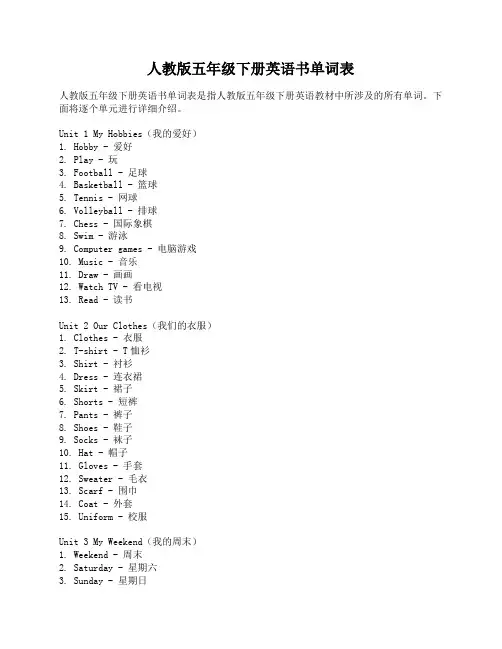
人教版五年级下册英语书单词表人教版五年级下册英语书单词表是指人教版五年级下册英语教材中所涉及的所有单词。
下面将逐个单元进行详细介绍。
Unit 1 My Hobbies(我的爱好)1. Hobby - 爱好2. Play - 玩3. Football - 足球4. Basketball - 篮球5. Tennis - 网球6. Volleyball - 排球7. Chess - 国际象棋8. Swim - 游泳9. Computer games - 电脑游戏10. Music - 音乐11. Draw - 画画12. Watch TV - 看电视13. Read - 读书Unit 2 Our Clothes(我们的衣服)1. Clothes - 衣服2. T-shirt - T恤衫3. Shirt - 衬衫4. Dress - 连衣裙5. Skirt - 裙子6. Shorts - 短裤7. Pants - 裤子8. Shoes - 鞋子9. Socks - 袜子10. Hat - 帽子11. Gloves - 手套12. Sweater - 毛衣13. Scarf - 围巾14. Coat - 外套15. Uniform - 校服Unit 3 My Weekend(我的周末)1. Weekend - 周末2. Saturday - 星期六3. Sunday - 星期日4. Morning - 上午5. Afternoon - 下午6. Evening - 晚上7. Get up - 起床8. Have breakfast/lunch/dinner - 吃早餐/午餐/晚餐9. Go to school - 去学校10. Do homework - 做作业11. Visit grandparents - 拜访祖父母12. Go shopping - 去购物13. Play games - 玩游戏14. Watch a movie - 看电影15. Go fishing - 去钓鱼Unit 4 Healthy Food(健康食品)1. Food - 食物2. Fruit - 水果3. Apple - 苹果4. Banana - 香蕉5. Orange - 橙子6. Watermelon - 西瓜7. Pear - 梨8. Strawberry - 草莓9. Grapes - 葡萄10. Vegetable - 蔬菜11. Carrot - 胡萝卜12. Tomato - 番茄13. Cucumber - 黄瓜14. Potato - 土豆15. Broccoli - 西兰花Unit 5 I am Hungry(我饿了)1. Hungry - 饿了2. Thirsty - 口渴3. Breakfast - 早餐4. Lunch - 午餐5. Dinner - 晚餐6. Sandwich - 三明治7. Hamburger - 汉堡包8. Pizza - 披萨9. Noodle - 面条10. Rice - 米饭12. Chicken - 鸡肉13. Meat - 肉14. Fish - 鱼15. Egg - 鸡蛋Unit 6 Weather(天气)1. Weather - 天气2. Sunny - 晴天3. Cloudy - 多云4. Windy - 多风5. Rainy - 下雨6. Snowy - 下雪7. Temperature - 温度8. Hot - 热9. Cold - 冷10. Cool - 凉爽11. Warm - 暖和12. Umbrella - 雨伞13. Jacket - 夹克14. Boots - 靴子15. Cap - 帽子Unit 7 My School Day(我的学校生活)1. School day - 学校生活2. Class - 班级3. Teacher - 老师4. Student - 学生5. Subject - 学科6. Math - 数学7. Chinese - 语文8. English - 英语9. Science - 科学10. Art - 美术11. PE - 体育12. Music - 音乐13. Lunch break - 午休14. Recess - 课间休息15. Library - 图书馆Unit 8 Feelings(情感)1. Happy - 快乐3. Angry - 生气4. Excited - 兴奋5. Scared - 害怕6. Surprised - 惊讶7. Bored - 无聊8. Tired - 疲倦9. Proud - 骄傲10. Shy - 害羞11. Anxious - 焦虑12. Disappointed - 失望13. Relieved - 放心14. Grateful - 感激15. Jealous - 嫉妒Unit 9 My Community(我的社区)1. Community - 社区2. Neighbourhood - 邻里3. Park - 公园4. Supermarket - 超市5. Hospital - 医院6. Library - 图书馆7. Post office - 邮局8. Bank - 银行9. School - 学校10. Restaurant - 餐厅11. Cafe - 咖啡馆12. Playground - 游乐场13. Community centre - 社区中心14. Police station - 派出所15. Fire station - 消防站Unit 10 Safety(安全)1. Safety - 安全2. Dangerous - 危险3. Risk - 风险4. Protect - 保护5. Safe - 安全的6. Caution - 警告7. Warning - 注意8. First aid - 急救9. Injury - 伤害10. Accident - 事故11. Fire - 火12. Escape - 逃生13. Police - 警察14. Ambulance - 救护车15. Safety rule - 安全规则以上就是人教版五年级下册英语书单词表的详细介绍。
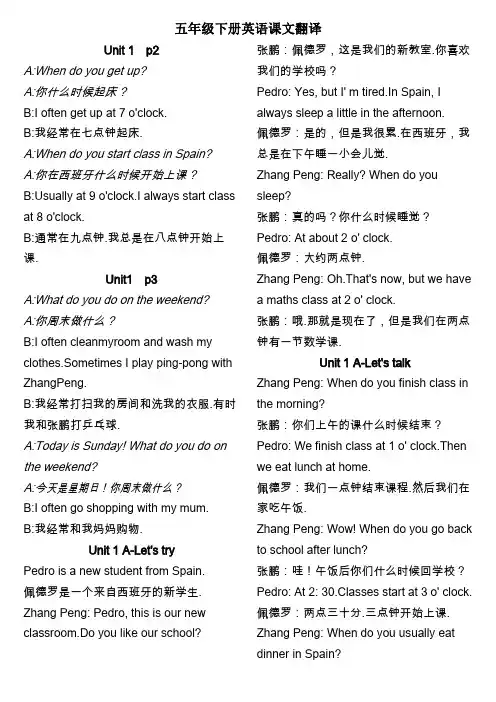
Unit1p2A:When do you get up?A:你什么时候起床?B:I often get up at7o'clock.B:我经常在七点钟起床.A:When do you start class in Spain? A:你在西班牙什么时候开始上课?B:Usually at9o'clock.I always start class at8o'clock.B:通常在九点钟.我总是在八点钟开始上课.Unit1p3A:What do you do on the weekend?A:你周末做什么?B:I often cleanmyroom and wash my clothes.Sometimes I play ping-pong with ZhangPeng.B:我经常打扫我的房间和洗我的衣服.有时我和张鹏打乒乓球.A:Today is Sunday!What do you do on the weekend?A:今天是星期日!你周末做什么?B:I often go shopping with my mum.B:我经常和我妈妈购物.Unit1A-Let's tryPedro is a new student from Spain.佩德罗是一个来自西班牙的新学生. Zhang Peng:Pedro,this is our new classroom.Do you like our school?张鹏:佩德罗,这是我们的新教室.你喜欢我们的学校吗?Pedro:Yes,but I'm tired.In Spain,I always sleep a little in the afternoon.佩德罗:是的,但是我很累.在西班牙,我总是在下午睡一小会儿觉.Zhang Peng:Really?When do you sleep?张鹏:真的吗?你什么时候睡觉?Pedro:At about2o'clock.佩德罗:大约两点钟.Zhang Peng:Oh.That's now,but we have a maths class at2o'clock.张鹏:哦.那就是现在了,但是我们在两点钟有一节数学课.Unit1A-Let's talkZhang Peng:When do you finish class in the morning?张鹏:你们上午的课什么时候结束?Pedro:We finish class at1o'clock.Then we eat lunch at home.佩德罗:我们一点钟结束课程.然后我们在家吃午饭.Zhang Peng:Wow!When do you go back to school after lunch?张鹏:哇!午饭后你们什么时候回学校?Pedro:At2:30.Classes start at3o'clock.佩德罗:两点三十分.三点钟开始上课. Zhang Peng:When do you usually eat dinner in Spain?张鹏:你在西班牙通常什么时候吃晚饭?Pedro:Usually at9:30or10o'clock.佩德罗:通常在九点三十分或者十点钟. Zhang Peng:Wow!That's too late!张鹏:哇!那太晚了!Unit1B-Let's trySarah:Hello,Mrs Green.Good to see you!萨拉:你好,格林夫人.见到你很高兴!Shopkeeper:Hi,Sarah.Welcome to our shop again.店主:嗨,萨拉.欢迎再次来到我们的商店. Sarah:I want to buy some vegetables.萨拉:我想要买一些蔬菜. Shopkeeper:Here are some fresh carrots.You don't often shop here on Saturdays.店主:这是一些新鲜的胡萝卜.你星期六不经常在这里购物.Sarah:No,not often.萨拉:是的,不经常.Unit1B-Let's talk Shopkeeper:Why are you shopping today?店主:今天你为什么购物?Sarah:My mum worked last night.So I'm shopping today.萨拉:我妈妈昨晚工作了,所以今天我购物.Shopkeeper:Good girl!So what do you do on the weekend?店主:好女孩儿!那么你在周末做什么?Sarah:I often watch TV and playping-pong with my father.萨拉:我经常看电视,也常和我爸爸一起打乒乓球.Shopkeeper:That sounds like a lot of fun.店主:那听起来好像很有趣.Sarah:Yes,but I'm also hard-working.I usually wash my clothes.Sometimes I cook dinner.萨拉:是的,但是我也很勤劳.我通常洗衣服.有时我做晚饭.Shopkeeper:You're so busy!You need a robot to help you!店主:你真忙!你需要一个机器人来帮助你!Unit1B-Read and writeRobin's play罗宾的戏剧Robin is in a play.He is Robinson Crusoe.Here is a letter from him.罗宾在演戏.他扮演鲁滨逊?克鲁索.这是一封来自他的信.My name is Robinson.I live on an island.I always get up early every day.I wash my face,and then I eat breakfast.Sometimes I clean my cave,too.我的名字是鲁滨逊.我住在一个岛上.我每天总是很早起床.我洗脸,然后吃早饭.有时我也打扫我的山洞.I often go swimming in the water.In the afternoon,I play sports with my friend.His name is Friday.我经常去水里游泳.下午,我和我的朋友进行体育运动.他的名字是星期五.Friday is good at sports.He often wins.星期五擅长体育运动.他经常获胜.Unit1B-Let's checkAmy:Mike,let's go swimming on the weekend.埃米:迈克,让我们周末去游泳吧. Mike:I'm sorry.I can't.迈克:我很抱歉.我不能去.Amy:Why not?埃米:为什么不呢?Mike:I always clean my room and do my homework on the weekend.迈克:我总是在周末打扫我的房间并且做家庭作业.Amy:OK.埃米:好吧.Mike:Have fun!迈克:玩得开心点!Unit2P12A:Which season do you like best?A:你最喜欢哪个季节?B:Autumn.B:秋天.A:Why?A:为什么?B:Because the colours are pretty!B:因为颜色很漂亮!A:Which season do you like best?A:你最喜欢哪个季节?B:Winter!I can sleep all day.How about you?B:冬天!我能整天睡觉.你呢?A:I like spring best.There are beautiful flowers every where.A:我最喜欢春天,到处都有美丽的花.Unit2P13A:Look at my picture,Miss White.I like summer best because of Children's Day. A:看我的图片,怀特老师.我最喜欢夏天,因为(有)儿童节.B:What do you often do in summer?B:你在夏天经常做什么?A:I often go swimming.A:我经常去游泳.Unit2A-Let's tryMike:It's a windy day.迈克:今天是多风的一天.Chen Jie:Yes.It's cold,too.陈杰:是的.还很冷.Mike:What's your favourite season,Chen Jie?迈克:你最喜欢的季节是什么,陈杰?Chen Jie:Autumn.It is beautiful here in Beijing.陈杰:秋天.在北京这里秋天很漂亮.Unit2A-Let's talkMr Jones:Do you like the music, children?琼斯老师:你们喜欢这个音乐吗,孩子们?Mike:Yes.It's very beautiful.What is it?迈克:喜欢.它很美妙.它是什么?Mr Jones:The Four Seasons.Today we'll draw the seasons.Which season do you like best,Mike?琼斯老师:《四季》.今天我们将画季节.你最喜欢哪个季节,迈克?Mike:Winter.I like snow.迈克:冬天.我喜欢雪.Mr Jones:I like snow,too.Which season do you like best,Wu Yifan?琼斯老师:我也喜欢雪.你最喜欢哪个季节,吴一凡?Wu Yifan:Spring.It's pretty.吴一凡:春天.它很美丽.Mr Jones:Yes,it is.琼斯老师:是的,它很美丽.Unit2B-Let's tryZhang Peng:Look at my picture,John.张鹏:看我的画,约翰.John:It's pretty.So you like spring best?约翰:它很漂亮.那么你最喜欢春天?Zhang Peng:Yes.Spring isbeautiful.There are lots of flowers.The trees are green.张鹏:是的.春天很漂亮.有许多花朵.树是绿色的.Unit2B-Let's talkAmy:Hello,Miss White.Look at my picture.埃米:你好,怀特老师.看我的画.Miss White:Good job!I like the trees.The colours are very pretty!怀特老师:做得好!我喜欢这些树.颜色很漂亮!Amy:Yes.I like autumn best.The weather is good and the colours are beautiful! Which season do you like best,Miss White?埃米:是的.我最喜欢秋天.天气很好,颜色很漂亮!你最喜欢哪个季节,怀特老师?Miss White:Summer.怀特老师:夏天.Amy:Why?埃米:为什么?Miss White:Because I like summer vacation!怀特老师:因为我喜欢暑假!Unit2B-Read and writeRobin likes them all!罗宾喜欢它们全部!Look at the green trees and pink flowers.看绿色的树和粉色的花.I like spring because there are beautiful flowers everywhere.我喜欢春天,因为到处都有美丽的花. The weather is hot,hot,hot!天气炎热、炎热、炎热!I like summer,but I can't swim.我喜欢夏天,但是我不会游泳.What lovely colours!The leaves fall and fall and fall.I love fall!多么美丽的颜色啊!叶子落啊落啊落.我爱秋天!Wow!I want to paint a picture,too!哇!我还想要画一幅画!There is lots of snow.It is white everywhere.有很多雪.到处都是白色的.I like winter because I can play in the snow.我喜欢冬天,因为我能在雪里玩.Unit2B-Let's checkBoy:When is your birthday?男孩:你的生日是什么时候?Girl:It's in summer.女孩:它在夏天.Boy:Do you like summer?男孩:你喜欢夏天吗?Girl:No,I don't.It's too hot.女孩:不,我不喜欢.夏天太热了.Boy:Which season do you like best?男孩:你最喜欢哪个季节?Girl:Autumn.The colours are beautiful.I can pick fresh apples.女孩:秋天.颜色很漂亮.我可以摘新鲜的苹果.Unit3P22、P23A:When is the summer vacation?A:暑假是什么时候?B:It's in July and August.B:在七月和八月.A:When is Tree Planting Day?A:植树节是什么时候?B:It'sin March.B:在三月.A:When is Dragon Boat Festival?A:端午节是什么时候?B:It's usually in June.My mum will make zongzi then.I hope you can come and share some with us.B:通常在六月.那时我妈妈将包粽子.我希望你能来和我们一起分享一些(粽子). A:That's very kind of you.A:你真是太好了.A:When is the school trip this year?A:今年的学校郊游是什么时候?B:It's in May.B:在五月.A:Is the singing contest in May,too? A:歌唱比赛也在五月吗?B:Yes.B:是的.A:Hooray for May!A:五月万岁!1January(Jan.)New Year's Day一月元旦2February(Feb.)winter vacation二月寒假3March(Mar.)Tree Planting Day三月植树节4April(Apr.)Easter\sports meet四月复活节\运动会5May(无缩写)MayDay\Mother's Day 五月劳动节\母亲节6June(Jun.)Children’s Day\Father's Day 六月儿童节\父亲节7July(Jul.)summer vacation七月暑假8August(Aug.)summer vacation八月暑假9September(Sept.)Teachers’Day\Mid-Autumn Day九月教师节\中秋节10October(Oct.)China's National Day十月中国国庆节11November(Nov.)American Thanksgiving Day十一月美国感恩节12December(Dec.)Christmas十二月圣诞节Unit3A-Let's tryMike:What's that,Zhang Peng?迈克:那是什么,张鹏?Zhang Peng:It's an invitation for my mum and dad.张鹏:它是一张给我妈妈和爸爸的请柬. Mike:What for?迈克:为了什么?Zhang Peng:For the sports meet next week.I will run.张鹏:为了下星期的运动会.我将要跑步. Mike:I see.Good luck!迈克:我知道了.祝你好运!Zhang Peng:Thank you!张鹏:谢谢你!Unit3A-Let’s talkMike:We have a few fun things in spring. After the sports meet,we have an Easter party.迈克:在春天我们有一些有趣的事情,运动会之后,我们举办一场复活节聚会。
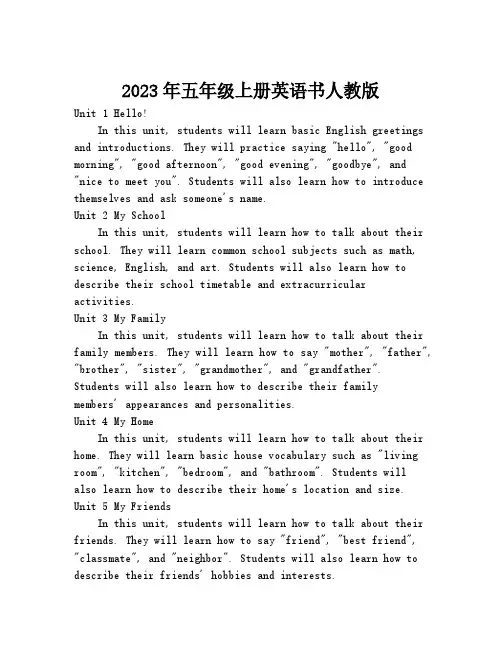
2023年五年级上册英语书人教版Unit 1 Hello!In this unit, students will learn basic English greetings and introductions. They will practice saying "hello", "good morning", "good afternoon", "good evening", "goodbye", and "nice to meet you". Students will also learn how to introduce themselves and ask someone's name.Unit 2 My SchoolIn this unit, students will learn how to talk about their school. They will learn common school subjects such as math, science, English, and art. Students will also learn how to describe their school timetable and extracurricularactivities.Unit 3 My FamilyIn this unit, students will learn how to talk about their family members. They will learn how to say "mother", "father", "brother", "sister", "grandmother", and "grandfather". Students will also learn how to describe their familymembers' appearances and personalities.Unit 4 My HomeIn this unit, students will learn how to talk about their home. They will learn basic house vocabulary such as "living room", "kitchen", "bedroom", and "bathroom". Students willalso learn how to describe their home's location and size.Unit 5 My FriendsIn this unit, students will learn how to talk about their friends. They will learn how to say "friend", "best friend", "classmate", and "neighbor". Students will also learn how to describe their friends' hobbies and interests.Overall, this English textbook aims to help fifth-grade students develop their language skills and build a solid foundation for future learning. Through engaging activities and interactive lessons, students will improve their listening, speaking, reading, and writing abilities. By the end of the school year, students will be able to confidently communicate in English and express themselves effectively.。
五年级上册英语书人教版精通版单元主题课题unit1 we have new friends. Lesson 1课时第 1 课时授课日期1.能够正确地听、说、认读英语国家 Britain 的名称; 2.能够正确地听、说、读、写以下单词: I, you, am, is, my, your, friend 教学目标 3.能够正确地听、说、认读涉及住址的句子: I e from (Britain). 4.在适当的情景中正确地听、说、读、写下面的句子: I’m (Bob). I’m (eleven). 进一步提高对英语学习的热情,培养更加稳定的学习兴趣。
能积极主动地参与课堂活动,在情景对话中大胆开口,主动模仿。
I'm Bob. I'm eleven. I e from Britain. I'm Zhou Pei. I'm ten. I e from Bei __g. We have two new friends In our class. Wele to class.Come to the front. Go back to your seat.情境式教预习提纲: 1. Listen to the tape. 2.Preview the new words. 师生活动修改补备学流程教学辅助课件,卡片教学重点教学难点教学模式1 l. 热身/复习(Warming-up/Revision) 1)播放四年级上册第二课 Where are you from?和三年级下册第 8 课歌曲 How old are you?的磁带。
2 )让学生齐唱以上两首歌曲,在欢快的音乐中复习 Where are you from?I’m from China. How old are you?I’m seven. 等表达方式,为本课教学内容的学习做好铺垫。
2. 新课导入(Presentation) 1)展示本课的教学挂图,让学生观察。
人教版五年级上册英语书附录单词表附录1 各单元歌曲单元歌曲Unit 1Who's your teacher?Who's your English teacher at school? Who's your English teacher at school? Is she pretty or tall or short?Tell me what you know!Who's your Chinese teacher at school? Who's your Chinese teacher at school? Is he funny or young or old?Tell me what you know!Unit 2Days of the weekMonday, Tuesday, Wednesday, Thursday, Friday, Saturday, Sunday, Days for school and days for fun. Happy days for everyone!Unit 3What would you like to eat today?What would you like to eat today? Eat today? Eat today? What would you like to eat today? Something sweet to eat.Unit 4What can you do?What can you do? What can you do?I can sing English songs.Can you sing songs, too?I can do kung fu. I can do kung fu.I can dance and draw cartoons.Can you draw cartoons, too?Unit 5A photo of meBeside the big plant, What can you see? Above the big clock, There's a photo of me. Beside the big plant, What can you see? Between the two windows, There's a photo of me.Unit 6In a nature parkUp in the mountain, The mountain so high, There is a forest, Touching the sky. Deep in the forest, The forest so low, There is a flower, Starting to grow.附录2 单元词汇表(注:黑体词要求学生能够听、说、读、写;白体词只作听、说、认读要求。
人教版五年级上册英语书一年级起点全文共5篇示例,供读者参考人教版五年级上册英语书一年级起点篇1一、教学重点:动词短语及其ing形式:drawing pictures, doing the dishes, cooking dinner, reading a book, answering the phone 。
句型“what are you doing?”及其回答“i'm doing the dishes/….”。
二、教学难点:动词短语ing形式的读音,教师要多做示范,逐步引导学生流畅地连读。
三、课前准备:教师准备各种动词短语卡片、图片。
教师准备本课时let's chant, let's learn, let's sing的录音带。
教师准备锅、铲、电话、碗碟等小道具。
教师准备本课时所需课件。
四、教学过程:1、warm up (热身)活动一:口语练习教学参考时间:2—3分钟教师就学生所学过的内容或当时情景进行日常交际,目的在于运用语言。
可以是学生自我介绍,也可以是学生间对话练习。
如:my name's …. i'm 10/11 years old. i like pink and blue. i like to eat fish and hamburgers. i can swim and i can speak english.2、review (复习)活动二:师生交流教学参考时间:2—3分钟师生就所学知识进行交流,主要使用表示能力的句型,目的在于复习动词短语。
教师拿出动词短语的图片,说:look at these pictures. 。
随后,拿出其中一张图片与学生交流,如:i can draw.并做画画的动作。
最后问:can you draw?引导学生说:yes, i can.或me, too.在此基础上,初步渗透动词短语。
教师继续说:i can draw. i can draw a fish.引导学生说i can draw a book/a kite/….最后,教师引出we can draw pictures.强调并带读draw pictures 。
5年级上册英语书人教版电子书1. 简介5年级上册英语书是人教版电子书的一部分,主要针对5年级学生的英语学习需求设计。
本教材包含了各个单元的课文、练习题以及相关的学习资源,旨在帮助学生提高英语听、说、读、写的能力。
2. 教材特点5年级上册英语书人教版电子书具有以下特点:2.1 任务型教学本教材采用任务型教学的方法,通过情景设置和真实语言交际情境,将知识点融入到实际生活中,使学生能够在真实场景中运用所学英语知识。
2.2 循序渐进本教材按照课程大纲的学习进程,循序渐进地引导学生学习英语。
每个单元都有一定的难度递增,逐步提高学生的英语水平。
2.3 多样化的学习资源本教材提供了丰富多样的学习资源,包括听力练习、口语对话、阅读理解、写作练习等。
这些资源旨在帮助学生全面提升英语技能,培养他们的综合语言运用能力。
3. 教材结构5年级上册英语书人教版电子书共分为8个单元,每个单元的内容包括课文、词汇、语法、练习等。
3.1 单元一:Hello!这个单元主要介绍如何用英语进行自我介绍,并学习一些日常用语和问候语。
3.2 单元二:My School Life本单元介绍学校生活的相关话题,如课程安排、校园活动等。
3.3 单元三:Places of Interest这个单元主要介绍一些旅游景点的相关词汇和句型,培养学生对地理和旅游的兴趣。
3.4 单元四:Healthy Habits本单元主要介绍如何保持健康的生活习惯,并学习一些与健康相关的词汇和表达方式。
3.5 单元五:Let’s Celebrate!这个单元介绍了一些传统节日的英语表达方式,并帮助学生了解不同文化间的差异。
3.6 单元六:Food and Drinks本单元主要介绍食物和饮料的相关词汇,以及如何进行订餐和点餐的对话。
3.7 单元七:Our Hobbies这个单元带领学生了解不同的爱好,并学习如何用英语描述自己的爱好。
3.8 单元八:Our Community本单元介绍社区生活的相关话题,如家庭、邻居、交通等。
人教版pep五年级上册英语书小伙伴们!今天咱们来聊聊人教版PEP五年级上册的英语书。
一翻开这本书,就像是打开了一个充满奇妙英语世界的大门。
先说说那些单词吧。
书里的单词就像是一群性格各异的小精灵。
有些单词特别友好,一读就会,像“cat”(猫)、“dog”(狗),咱们在生活中经常能看到这些小动物,所以记起来轻松加愉快。
可是呢,也有一些调皮的单词,像“science”(科学),这个单词又长又有点拗口,感觉就像是一个在玩捉迷藏的小捣蛋,要费点劲儿才能把它抓住记牢。
再看看课文部分。
课文就像是一个个有趣的小故事。
里面的人物特别鲜活,有调皮的小男孩,还有聪明的小女孩。
这些课文里有好多实用的对话呢。
比如说,在谈论自己的日常喜好的时候,“What do you like? I like reading books.”(你喜欢什么?我喜欢读书。
)这就像是我们在和朋友聊天一样自然。
而且课文里还会有一些小情节,像是小伙伴们一起商量周末去做什么,感觉就像是发生在自己身边的事情。
还有那些语法知识,本来语法听起来是个很枯燥的东西,就像硬邦邦的石头。
但是在这本书里,语法就像是被施了魔法一样,变得容易理解多了。
比如一般现在时,通过课文里人物每天做的事情来体现,像“He gets up at six o'clock every day.”(他每天六点起床。
)这样一结合,就不会觉得语法是那种让人头疼的东西啦。
书里的插图也特别棒。
那些色彩鲜艳的插图就像是一个个无声的小助手。
当你看到一幅画着一家人在餐桌前吃饭的插图,旁边配着关于食物的英语单词和句子,你一下子就能明白这个单词或者句子的意思了。
比如说“rice”(米饭),看着画里那碗白白的米饭,这个单词就深深地印在脑海里了。
而且啊,书里还会有一些小练习。
这些练习就像是一个个小挑战,做完之后就感觉自己像个英语小勇士。
有填空练习,就像是给句子这个小房子填补缺失的砖块;还有选择题,就像是在几个有趣的选项里挑选最正确的小伙伴。
五年级上册英语书人教版三年级起点一、课本基本信息。
二、单词部分。
1. 重点单词分类。
- 人物类:如teacher(教师)、student(学生)、friend(朋友)等。
这些单词在描述学校生活、人物关系时经常用到。
例如,“My friend is a good student.”(我的朋友是一个好学生。
)- 地点类:school(学校)、classroom(教室)、library(图书馆)等。
在描述活动发生的地点时会用到,如“We read books in the library.”(我们在图书馆看书。
)- 日常用品类:book(书)、pen(钢笔)、pencil - box(铅笔盒)等。
例如,“I have a new pencil - box.”(我有一个新的铅笔盒。
)- 动物类:cat(猫)、dog(狗)、rabbit(兔子)等。
可能出现在描述宠物或者自然相关的话题中,像“My cat is very cute.”(我的猫很可爱。
)- 形容词类:big(大的)、small(小的)、tall(高的)、short(矮的)等。
用于形容人或事物的特征,如“He is a tall boy.”(他是一个高个子男孩。
)2. 单词记忆方法。
- 联想记忆法:例如,记忆“pencil - box”,可以联想铅笔盒里装着铅笔(pencil)、橡皮(eraser)等文具,这样就更容易记住这个单词。
- 对比记忆法:像“big”和“small”,“tall”和“short”,把一对反义词放在一起记忆,通过对比它们的意义来加深印象。
三、语法部分。
1. 一般现在时。
- 用法:表示经常或习惯性的动作或状态。
例如,“I often go to school at 7 o'clock.”(我经常7点去上学。
)- 动词形式:当主语是第三人称单数(he/she/it等)时,动词要加 - s或 - es。
如“He likes reading books.”(他喜欢读书。
一. 读一读,看一看。
选择与图片相符的单词或短语,并将其字母编号填在题前括号内。
(20分)
()1.A.water flowers B.flowers bloom C.Easter egg
()2.A.play basketball B.plant trees C.play football
()3. A.fur B.feather C.leopard
()4. A.blouse B.shirt C.shorts
()5. A.leaves fall B.harvest C.plants grow
()6. A.river ke C.sea
()7. A.paints B.paintbox C.boat
()8. A.turtle B.zebra C.bird
()9. A.trousers B.coat C.jeans
()10.A.mountain B.forest C.desert
二. 读一读,选择恰当的词完成句子,并将其编号填在题前括号内.20分)
()1.—What are you going to do,Lele?
--- _____ going to plant trees. (A.I’m B.We’re)
()2.---Why do you love zebra?
----_____ they have stripes. (A.But B.Because)
()3.---What season is it?
---It’s _____ spring. (A. a B.不填)
()4.---Where do monkeys _____?
----They live in the mountain. (A. live B.lives)
()5.---Where do you live?
----I live____the earth. (A.in B.on)
()6.—Do you like squirrels?
---Yes, I _____. (A.do B. can)
()7.---What do you wear in spring?
----I wear a _____. (A.T-shirt B.sweater)
()8.---Why do you love squirrels?
---_____they have nice tails.(A.But B.Because)
()9.---What colour is spring?
---It’s _____.Because plants grow.(A.green B.red)
()10.---He _____ an Easter egg. (A.need B. needs)
三. 读一读A栏中的句子,在B栏中找出合适的答语,并把B栏中的字母编号填入题前括号内。
(12分)
A B
()1.What are you going to do? A. It’s yellow.
()2.What season is it? B.I live in Sichuan.
()3.Why do you love turtles? C.We’re going to dance.
()4.Do you like dolphins? D.It’s summer.
()5.Where do you live? E.Because they are cute.
()6.What colou is autumn? F. No,I don’t.
四. 单项选择,选择合适的答语并将其编号填入题前括号内.20分
()1.---What do you wear,Lele? ----________.
A. I wear a dress.
B. I wear jeans.
C. I wear a blouse.
()2. Winter is here. It’s getting ______.
A.hot
B.cold
C.warm
()3. We live in ______.
A.Sichuan
B.china
C.chongqing ()4. Look! There is a bird _____ the tree.
A.on
B.in
C.at
()5. It’s hot. It’s time to _______.
A. go skating
B.go for an outing
C.go swimming
()6.---What do you _____? ----T-shirt.
A.wear
B.needs
C.put on ()7. Flowers ____in spring.
A.bloom
B.blow
C.plant
()8. Spring _____ from March to May.
st
sts
C.are
()9. It’s hot. She ____ a hat.
A.want
B.needs
C.have
()10.---Sorry! ---_____.
A.That’s OK.
B.That’s ok.
C.that’s OK.
五. 情景对话。
(根据语境,选择合适的话语使下列对话完整.10分) ()1.---_____________ ---We wear sweaters.
A.What do you wear in summer?
B.What do you wear in autumn?
C.What do you wear in spring?
()2.---What do you wear,Dad? ----_____________
A.I wear jeans.
B.I wear a skirt.
C.I wear a blouse.
()3.---When is spring? -----__________.
A.From March to May.
B.From June to August.
C.From Sept to Nov.
()4.---What colour is spring? ----__________
A.It’s green.
B.It’s yellow.
C.It’s red.
()5.---It’s cold. ----__________
A. I needs a hat.
B. I need gloves.
C. He need a cap.
六. 选词填空。
(请把方框中的词填在横线上,每词限用一次.8分)
1. Leaves turn yellow and fall. It’s _______.
2. Trees are green and flowers bloom. It’s _______.
3. It snows. It’s ______.
4. Plants grow and birds sing. It’s _______.
七. 小小翻译家。
(请将下列单词或句子翻译成汉语。
)(10分)
1.earth ________
2.shirt ________
3.dumplings_______
4.snow ________
5.dig a hole _________
6.desert _________
7.It’s time to go swimming._______________________
8.I need a paintbox. ___________________
9.I wear a blouse and jeans. __________________
10.Autumn is here, it’s getting cool. __________________。